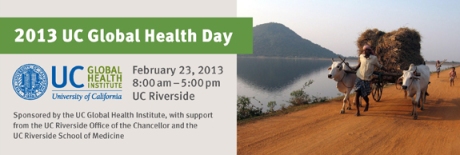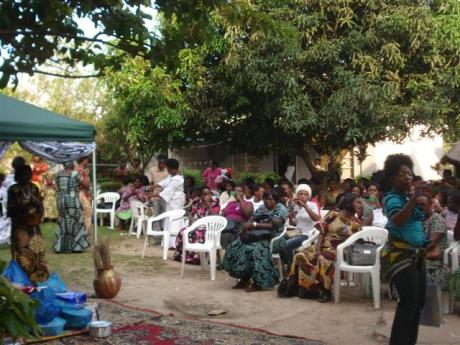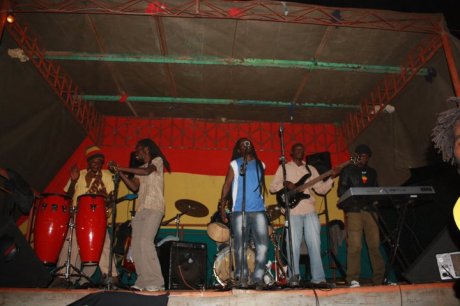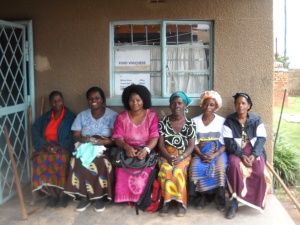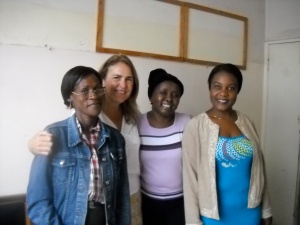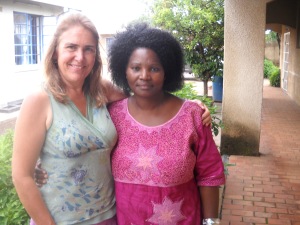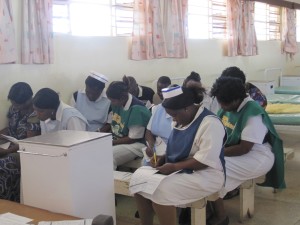It’s hard to believe it’s been 2 years since I was in Zambia! I am so thankful to have had this experience; it was pivotal in deciding my future career. Rather than recount all of the wonderful things other posts have mentioned, I thought I’d share a few emails I sent while I was there.
To current and future interns: safe travels and good luck!
Mari (Ndola: Oct – Dec 2009)
December 24, 2009: monkeys on my back
This past weekend I went to Chimfunshi Wildlife Orphanage – home to over 120 chimpanzees, 1 hippo and a variety of local birds. It used to be quite common for chimpanzees to be smuggled from the Congo to other parts of Africa through Zambia; the orphanage started in 1983 when a smuggled chimp in poor health (Pal) was brought to the founders Shelia and Dave Siddle. Through the years, people started hearing there was a place that could care for sick/abandoned/unwanted chimps and started dropping them off right and left.
Originally, the founders believed that every chimpanzee had a right to have a child, but when the population started to grow beyond the funds they had, that changed. Now the chimps practice family planning with female birth control implanted in their arms unless they selectively breed them. The organization is primarily run by private donations by individuals and local grocery stores (they donate their old vegetables, sodas, corn meal, biscuits… anything a human could eat, they’ll give to the chimps).
We (Emily, Debbie and I) took 5 of them for a bushwalk. These guys were all between 3 – 8 years old, although as you can see from the pics, 8-year-olds are about the same size as Emily! Was a little bit like trying to walk somewhere with a human 3-year-old. They come over to grab your hand, but soon forget they’re holding it while they try to do a somersault while holding on. The chimps wanted to be held when walking and were constantly looking for snacks. I particularly enjoyed it when one of the little ones (Dominick) snuck up on the largest one (Cindy), full-out slapped her in the back and then ran off to hide behind Emily and pretend it didn’t happen.
Chimps don’t natively live anywhere in Zambia, but they do find them just over the borders in the Congo, Tanzania and Uganda. These ones are being far too spoon-fed to be able to be re-released into the wild, but they hope to contribute to ongoing research that could help us continue to protect their species.
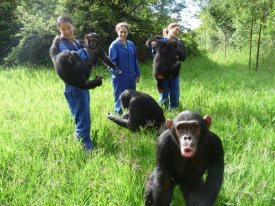
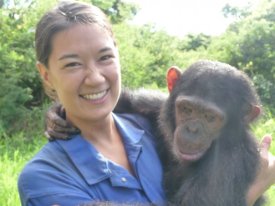

photos: (1) me, emily, debbie & chimp friends (2) me (3) emily
November 12, 2009: happy 1 month zambia
Today’s my 1 month anniversary of arriving in Zambia. I thought I’d do a little overview of unexpected trends I’ve seen. Please keep in mind I’ve still only met a fairly small slice of life thus far:
- Adults dress nicely wherever they go: often suits for men and colorful chitenge skirts for women
- Perhaps it’s the British influence, but language is often formal as well, women are “madams,” men are “sirs”
- Gender roles are very defined: women are generally expected to take care of the house and meals, men come home expecting to be served food (although there are always exceptions to this
- Homosexuality is not talked about (people tell me it’s illegal), abortions are difficult to have (they are legal, but called “criminal abortions” and require meeting with a doctor, psychologist and respected member of the community before completing), there are many counter-productive rumors about contraceptives (i.e. “condoms cause HIV”)
- Few women drink alcohol or go to bars, and if they do it’s cider, not beer
- When people talk about race they define the categories as “white,” “black,” or “colored” and then “black” is subdivided into shades
- Technology is popular, everyone owns a cell phone (even if they have to bike many kilometers to charge it). Some chitenge fabrics are patterned with laptops or cell phones



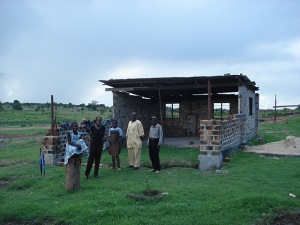
photos: (1) pumping water on the way home from luangua (2) a rainstorm outside my front door (3) kids playing with tires outside of a clinic (4) the start of nsonge and joseph’s school
November 7, 2009: mari on safari
That past few weeks have been wild, a few highlights:
- I went on safari in South Luangwa Park with Yi-Ling and Katie and saw just about every animal I would hope to (lions, leopard, hyena, elephants, giraffes, hippos, crocs).
- Our guides were incredible, we stopped by Andrew’s house so he could help try to fix (ie glue) our rental car. He’s seems like a pretty active member of the community, particularly in wildlife education. They recently had elephants come through and were scratching up against homes and eating crops, which often can result in elephant deaths unless someone like Andrew intervenes.
- I was able to visit our team in Lusaka to meet more of our team and see their facilities. It was interesting to see how a larger participant pool was being conducted and got some good ideas from Kelly about how to streamline forms in Ndola
- I moved into the spare bedroom of one of the doctor’s at Ndola – now I’m only a 10 min walk to the hospital!
- The weather has cooled down a bit and I’m ready to start baking cookies for the team!
We rewrote some of the lyrics to Toto’s “Africa” on our road trip to Luangwa:
It’s gonna take a lot to drive me away from Lu’ [angwa]
There’s nothing that a hundred men or more could ever glue
Pot-holed, dirt roads down in Africa
Gonna take too long before we’re back home in bed




photos: (1) katie, yi-ling, aminu and me relaxing at the lodge (2) giraffes (3) sleepy lion (4) family of elephants
October 25, 2009: births, deaths and chocolate mousse
This has been a week of firsts for me. I started my job at the Ndola Central Hospital where I witnessed my first birth of a healthy baby boy. I also directly contributed to the death of an animal for the first time, when Aminu and I killed a chicken for Nigerian pepper soup.
Some interesting things I’ve learned about birth and hospitals in Zambia thus far:
- When a woman gives birth successfully the doctors and nurses will congratulate her by saying “Mwa pusikeeni,” which means “You have survived”
- There’s no anesthesia unless you’re going in for a c-section or major surgery
- Diapers are nappies, napkins are serviettes; don’t ask for a napkin with your dinner
- To get a passport or drivers license, you need to have a doctor, lawyer or religious person verify your identity
I’m spending most of my time tracking down cases of obstetric hemorrhage to try to find out if we have applied the non-pneumatic anti-shock garment or not. And if we have, if we did it correctly and for the right reasons. This means I need to quickly get to know the nurses, midwives and doctors in the labor, ante-natal, post-natal, and gynae wards and their record keeping systems. Then, 2 days a week I head out to nearby clinics to see if they’re tracking patients or not and train them if they aren’t. In my head it’s all very straight forward, but throw in 100 different people, doctors’ handwriting, paper tracking, and 7 locations and it’s not quite as simple…
Luckily, everyone has been helpful (especially Yi-Ling and Aminu helping me acclimate!). I’ve been trying to learn a little bit of Bemba each day so I can at least greet people in their local language. This is a pretty continuous source of amusement for the native speakers, but I think (hope!) it’s helping. Outside of work we filled our time with visiting with friends, making food and trying out the local beers (Castle’s my favorite so far, although Mosi’s made in the brewery down the road). Last night we started to make dinner for Nsonge (and incredible lady that works in the hospital and is starting an orphanage on the side), then we added a few more people and a few more and ended up feeding 11 people a fabulous medley of Asian cuisine followed by coffee/chocolate/milo mousse with Amarula.
Shaleenipu until next time!

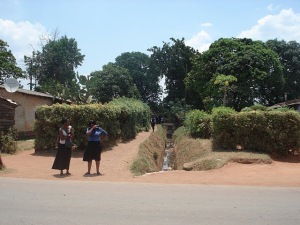
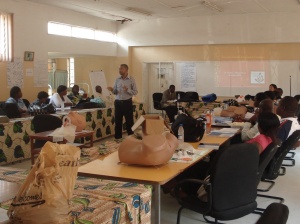

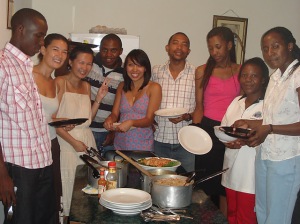
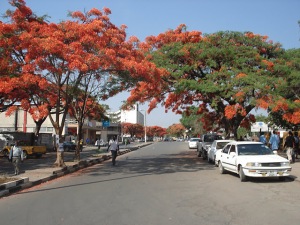
photos: (1) ndola central hospital (2) path to lubutu clinic (3) aminu giving a training on the nasg (4) yi-ling, aminu and me with the nasg (5) yi-ling’s going away dinner (6) downtown ndola
other: trips to victoria falls and tanzania



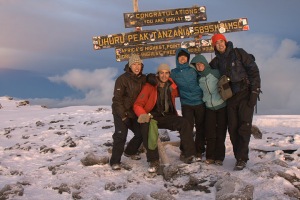
photos: (1) vic falls (2) angel’s pool at vic falls (3) climbing kilimanjaro after finishing up in zambia (4) summit of kili!

